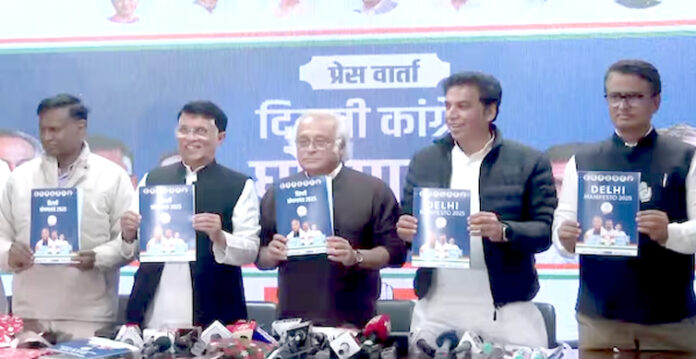As Delhi heads into its crucial elections, the Congress Party has unveiled its manifesto, offering an array of promises aimed at addressing a broad spectrum of public concerns. With its eyes firmly set on regaining influence in the capital, the Congress has positioned itself as a party that will meet the needs of the public through what it calls ‘guarantees’ — an assurance that is steeped in its historical narrative of social welfare. However, while the manifesto speaks to diverse sections of society, the question remains whether these lofty promises are achievable and whether they truly resonate with the electorate.
One of the central tenets of the manifesto is the commitment to conduct a caste census in Delhi, highlighting the party’s focus on social justice and the identification of marginalized groups. This initiative is promising, as it seeks to provide a data-driven approach to addressing the needs of various communities. The party’s focus on Purvanchalis, a key demographic in Delhi, with the promise of a dedicated ministry, shows Congress’s intent to address regional and cultural representation. The promise of free ration kits, LPG cylinders at subsidized rates, and a cash grant of Rs 2,500 to women reflects a desire to tackle the cost-of-living crisis that has deepened under successive administrations.
The proposal for a monthly financial support of Rs 8,500 to educated unemployed youth signals the party’s awareness of Delhi’s youth unemployment challenge. However, the real test will be in the fine print: Will these financial aid measures be timely and adequate in the face of the city’s burgeoning youth population?
Also Read: Muslim Voters to Play Decisive Role in Delhi Assembly Elections
On the environmental front, Congress has promised to address pollution with tangible measures. The manifesto’s focus on restoring the Yamuna River and setting up green police stations to tackle waste and pollution offers a concrete response to the city’s deteriorating environmental conditions. However, these actions will need extensive planning and coordination, especially given the political inertia often associated with large-scale urban issues in the capital.
The inclusion of social welfare policies, such as the restoration of Civil Defence volunteers and the provision of sports infrastructure, reveals the party’s desire to provide comprehensive support for both public health and recreation. The introduction of the Delhi Education Policy to replace the National Education Policy (NEP) 2020 is also an interesting move. Education is one of the most crucial issues facing Delhi, and it remains to be seen whether a locally tailored policy will offer improvements to the current framework.
Yet, with over 200 points in the manifesto, the real challenge will be implementation. Congress has made extensive promises, from providing free Char Dham Yatras for Dalit communities to offering subsidies on public transport, but these pledges need to be scrutinized for their viability. The political environment in Delhi is often polarized, with the AAP holding the reins of power since 2013, and skepticism about the feasibility of rival claims is natural. For example, offering free electricity up to 300 units and setting up 100 Indira canteens across the city are appealing initiatives, but they will require massive logistical coordination and funding.
Another critical aspect of the manifesto is its emphasis on ensuring equitable opportunities for women and marginalized communities. Initiatives like the Shagan of Rs 1.1 lakh for disadvantaged widows and the promise of 33 percent reservation for women in state government jobs are steps in the right direction. However, these efforts need to be reinforced by rigorous policy execution and a deep understanding of the barriers that women and marginalized groups face in Delhi.
The inclusion of guaranteed permanent employment for contract workers and the promise of financial empowerment for Scheduled Castes (SCs) through 15 percent reservation in government contracts shows Congress’s commitment to labor and social justice. But given the complex nature of labor laws and the entrenched systems in Delhi, turning these promises into reality will require significant political will and administrative overhaul.
The Congress manifesto also stresses inclusivity by addressing the needs of the LGBTQIA+ community, a refreshing aspect in a city that is increasingly becoming more progressive. The promise of increased working women’s hostels, better pay for Anganwadi and ASHA workers, and a focus on the welfare of the elderly, disabled, and transgender persons is laudable.
In conclusion, while Congress’s manifesto for Delhi promises a transformative approach to governance, its success will depend on the party’s ability to not only execute but also adapt these plans to the evolving needs of the city. The ambitious proposals demonstrate a clear understanding of the capital’s socio-economic landscape, but the reality of implementation, funding, and political support looms large. As Delhi goes to the polls, the electorate will need to weigh the promise of change with the practicalities of delivery, and Congress must convince voters that its pledges are not just election rhetoric but genuine commitments to the people of Delhi.
(This story is sourced from a third-party syndicated feed. Raavi Media takes no responsibility or liability of any nature. Raavi Media management/ythisnews.com can alter or delete the content without notice for any reason.)


